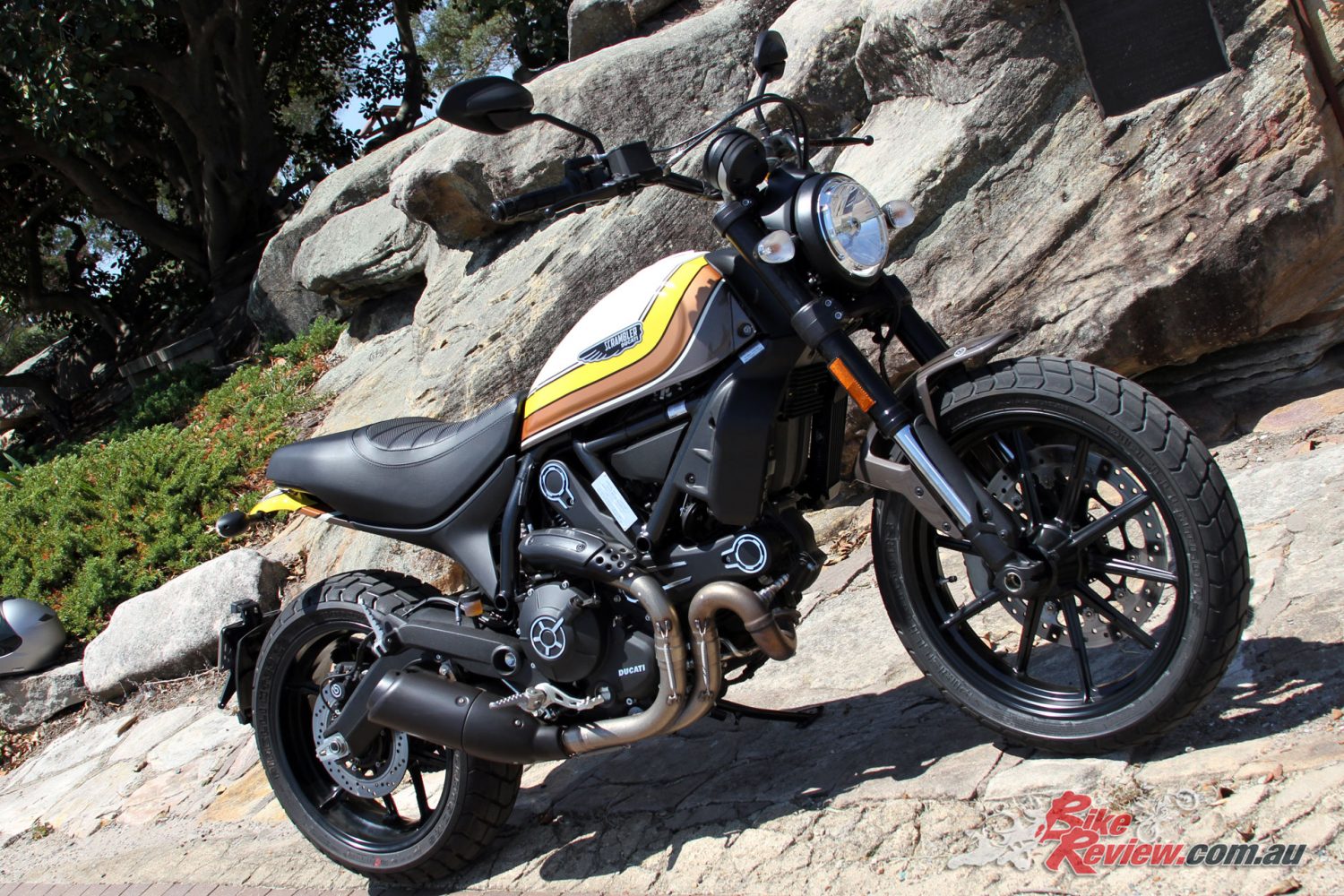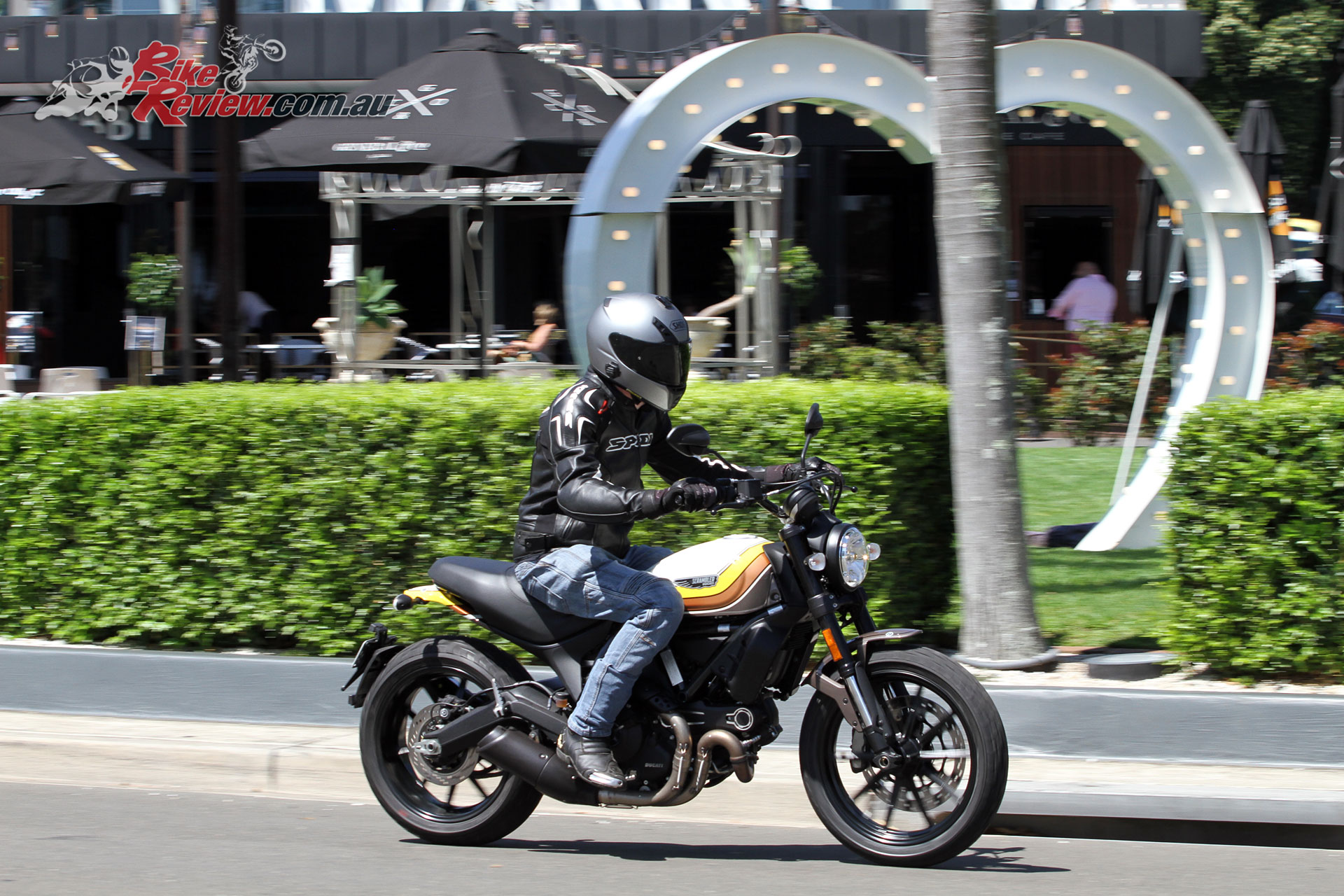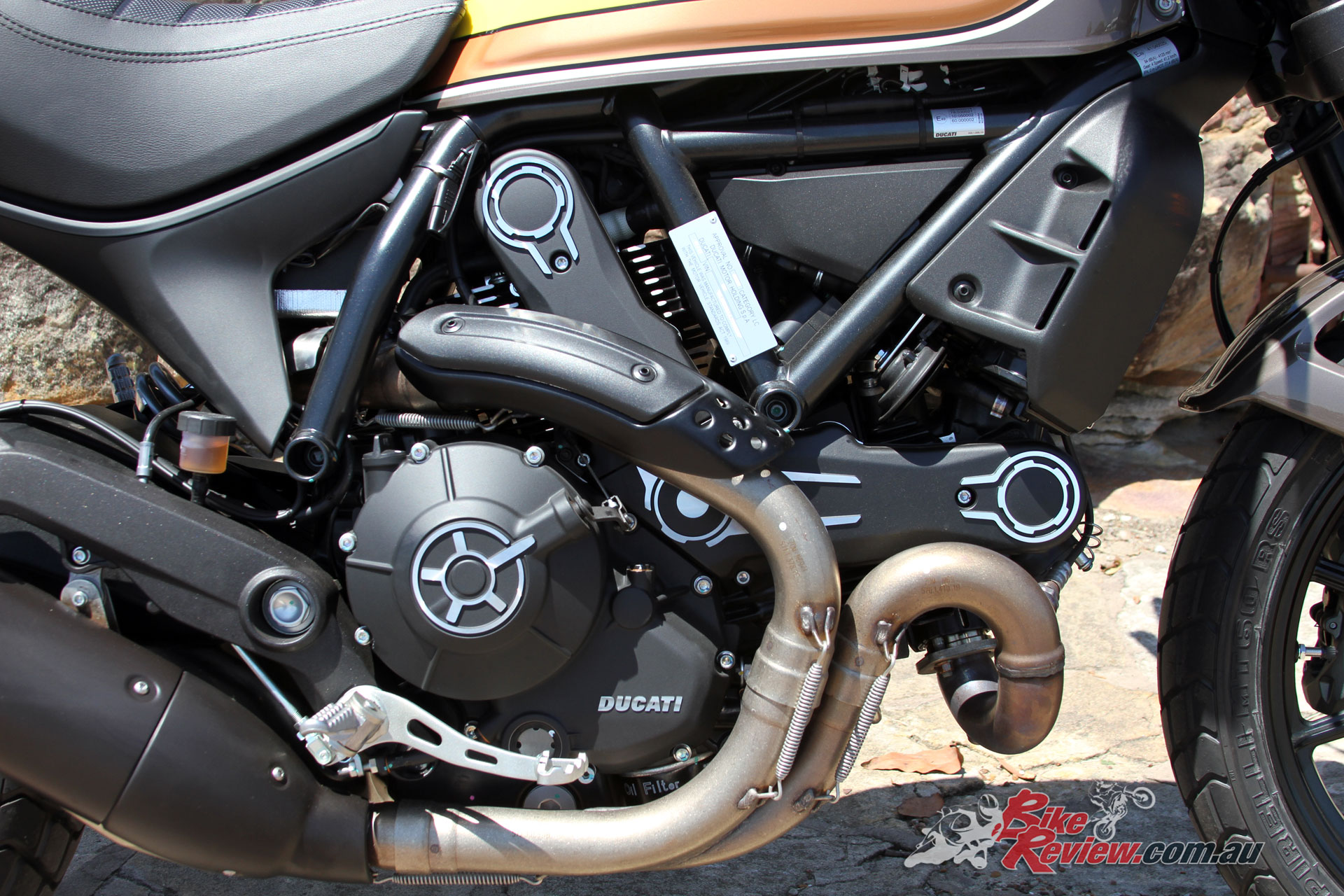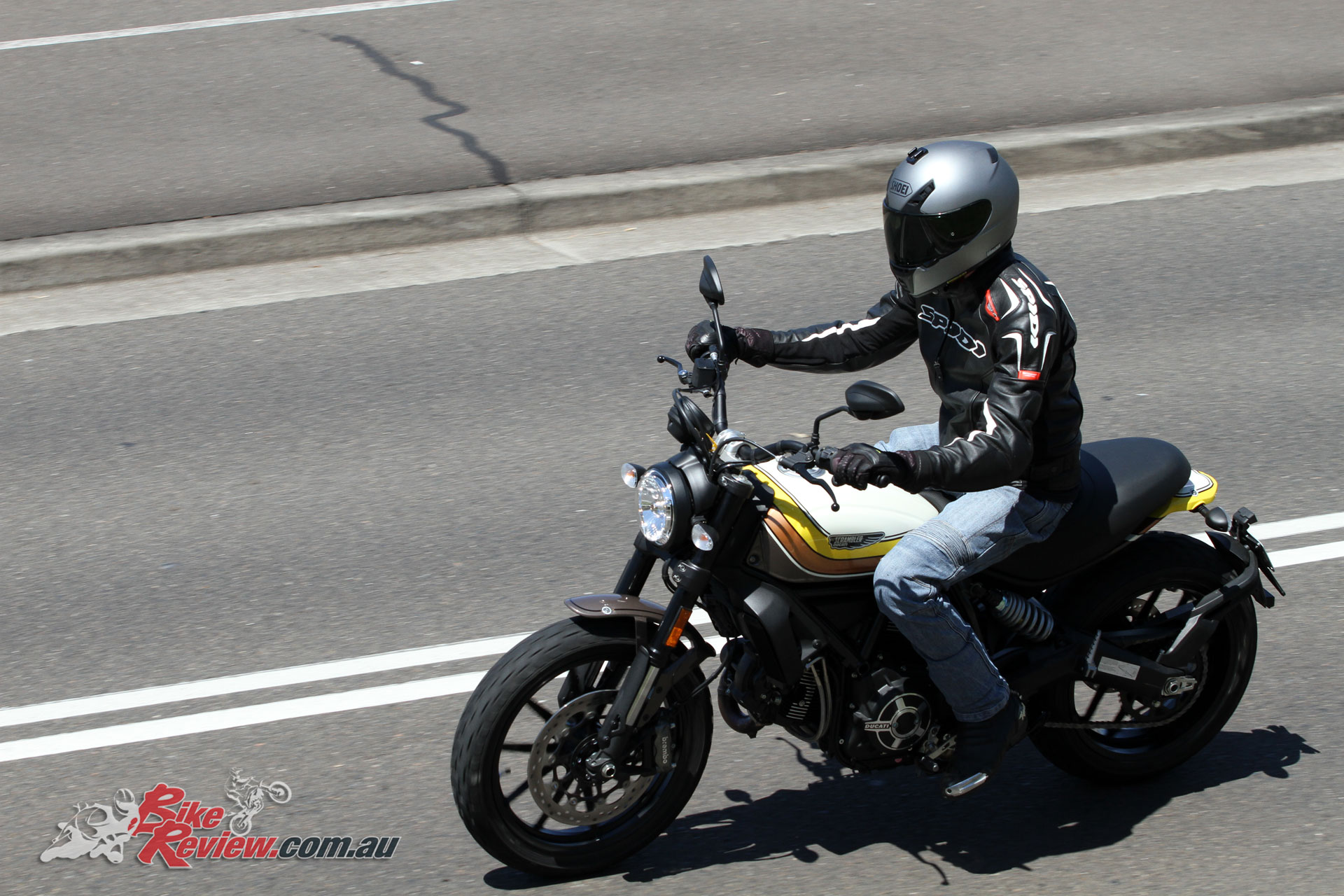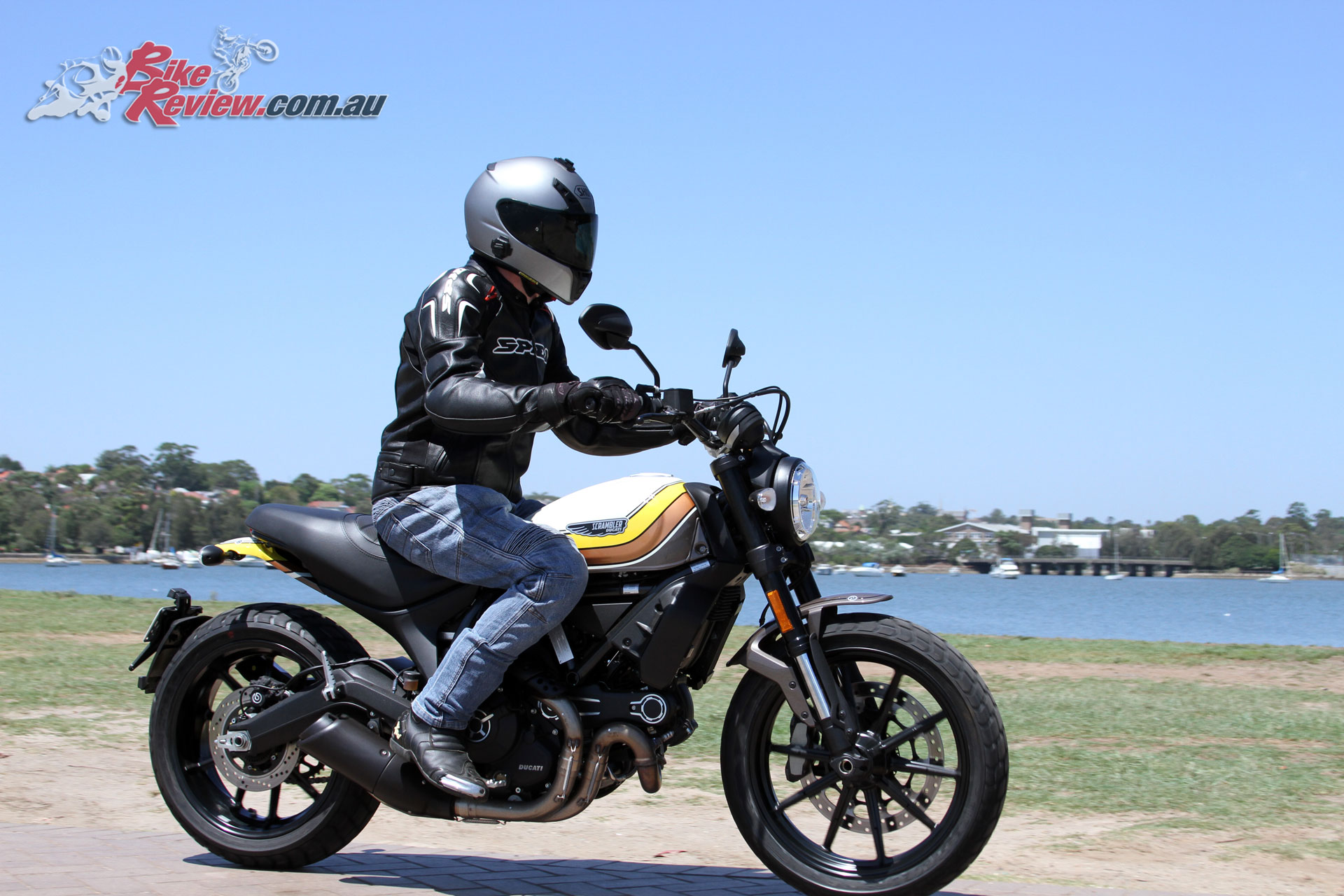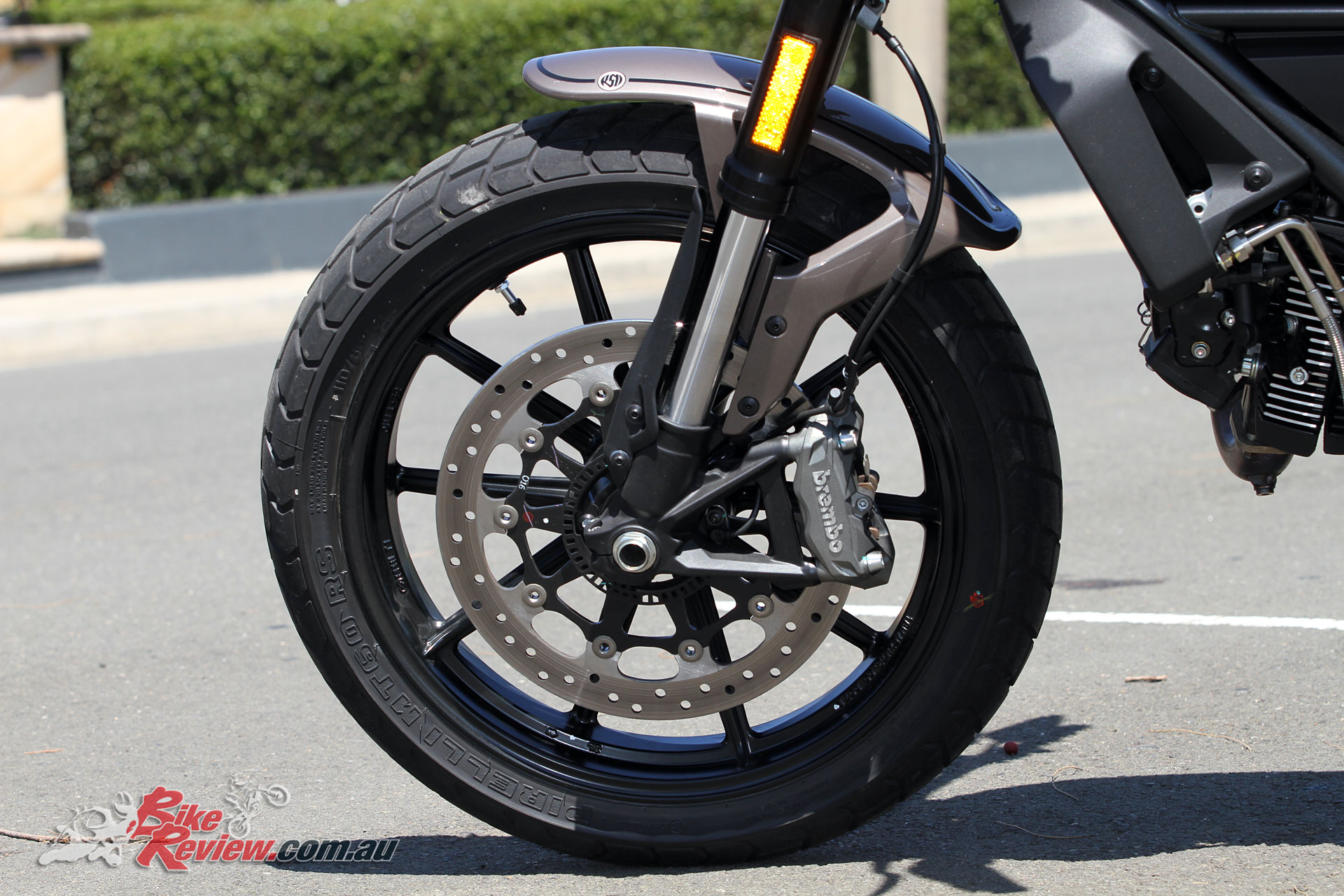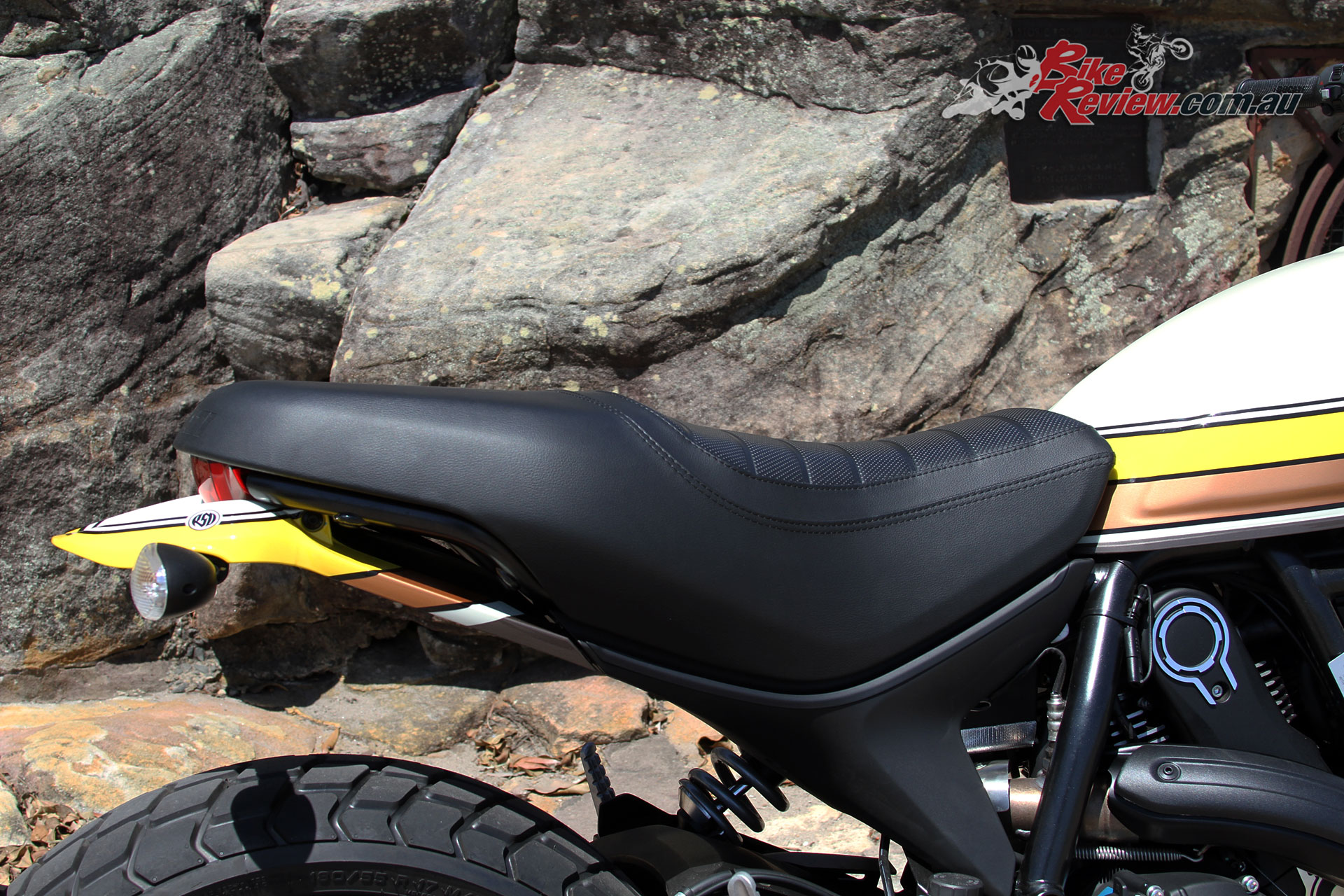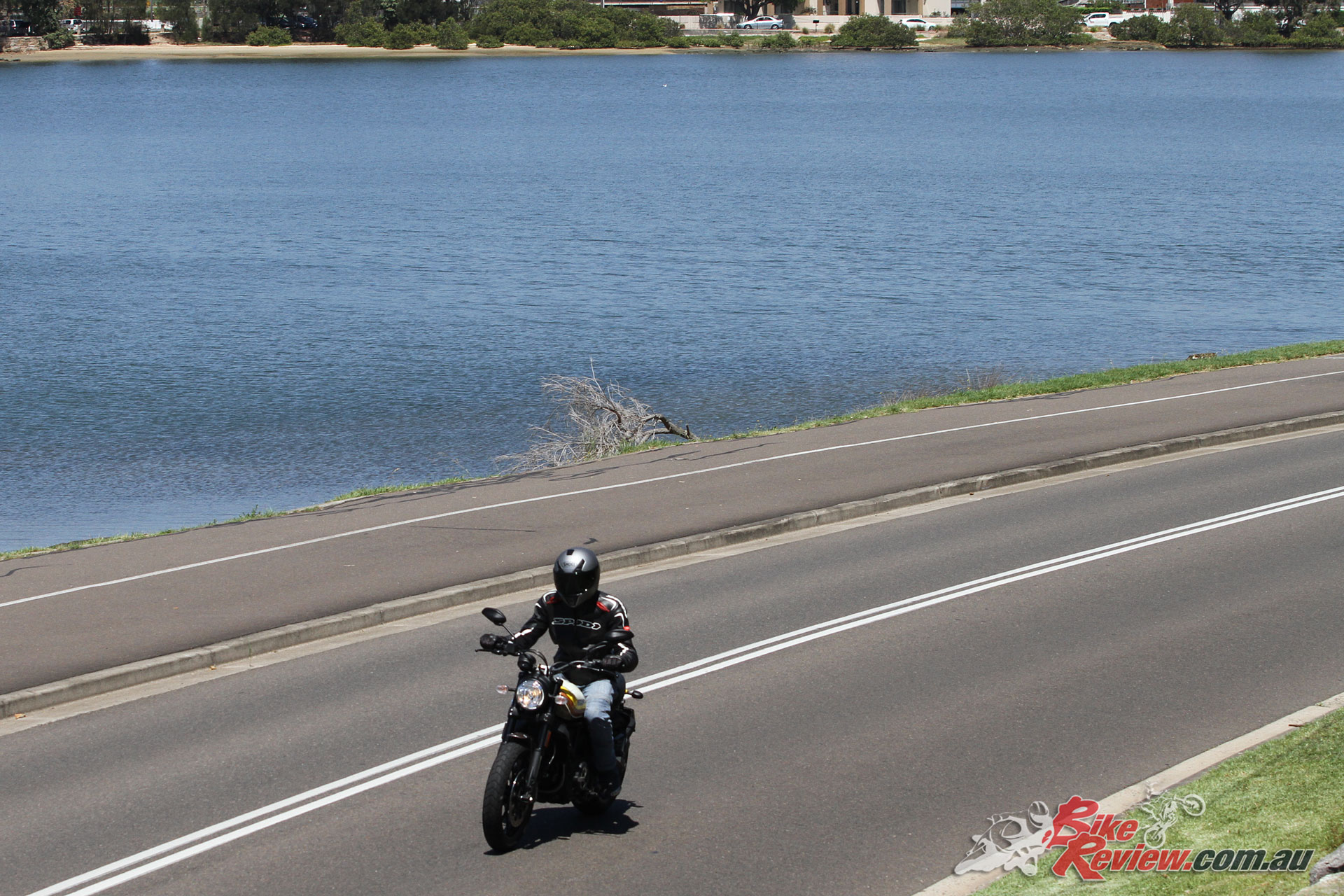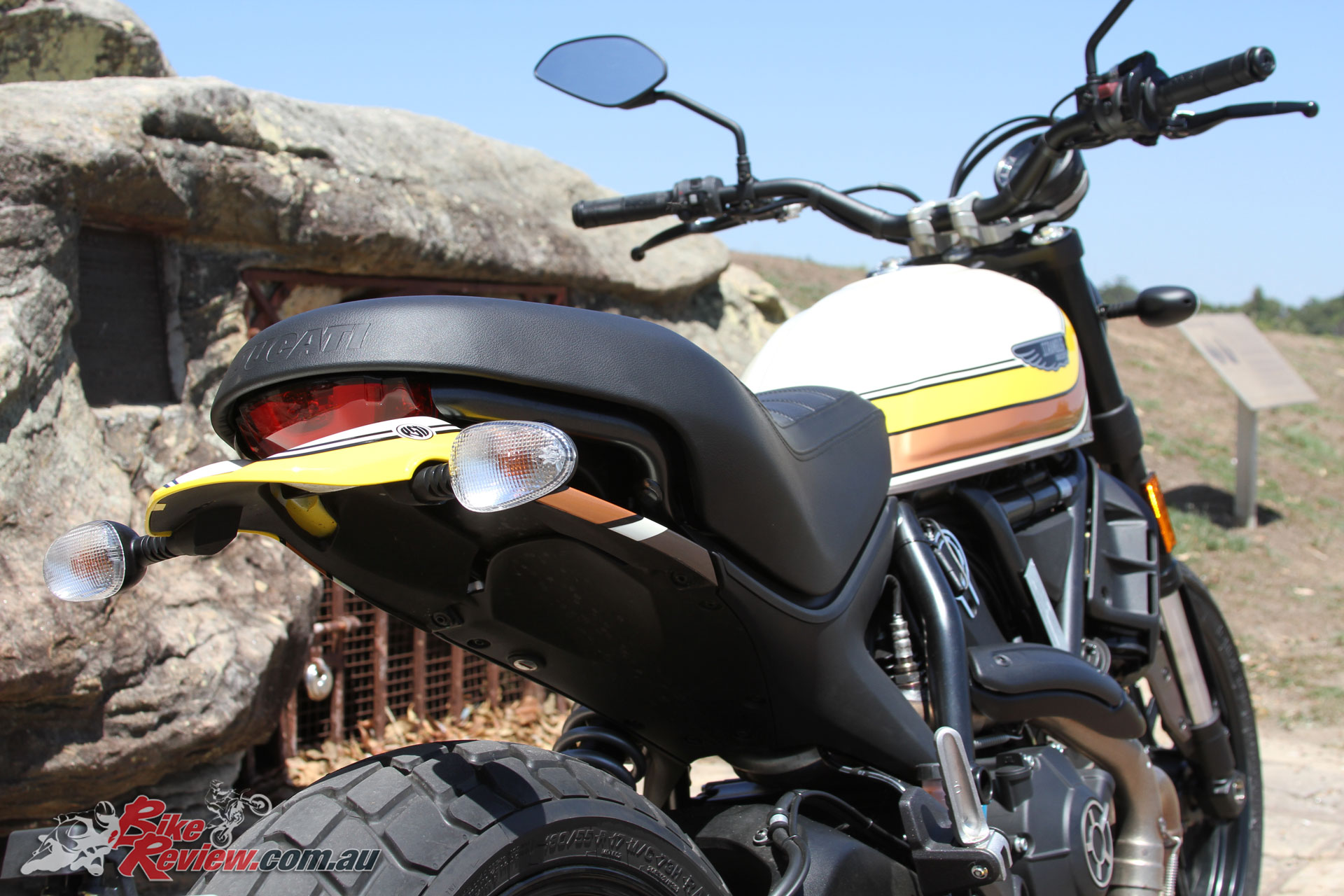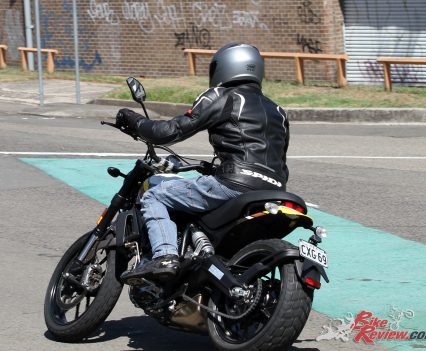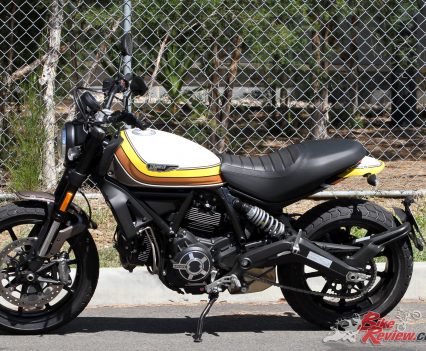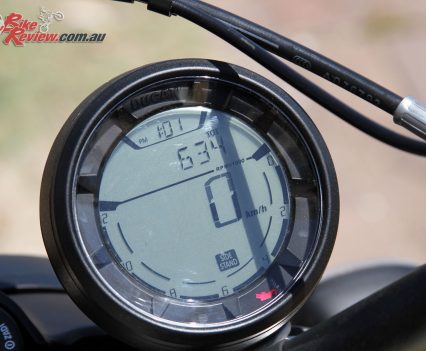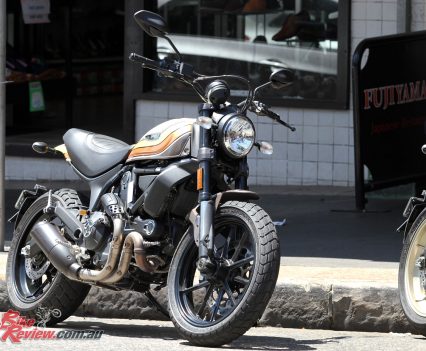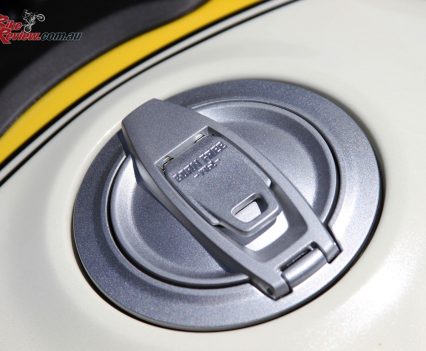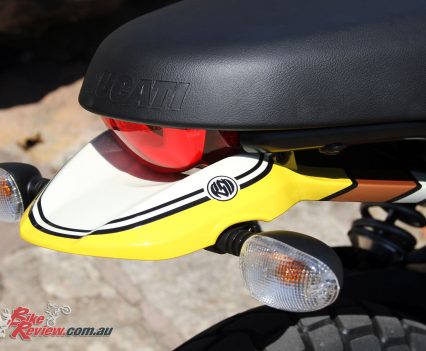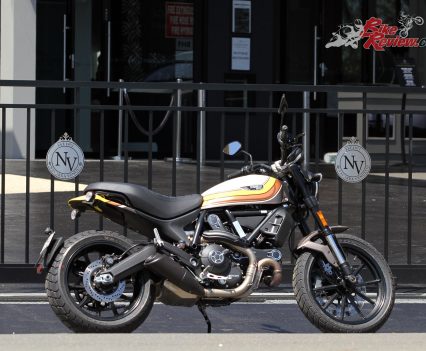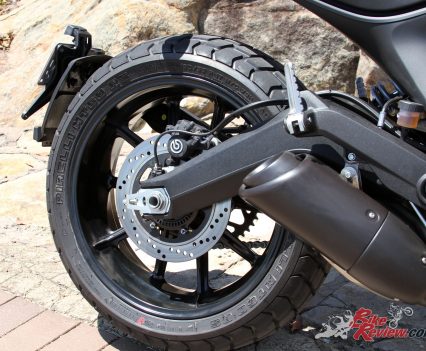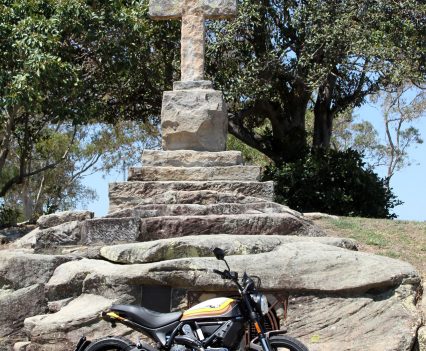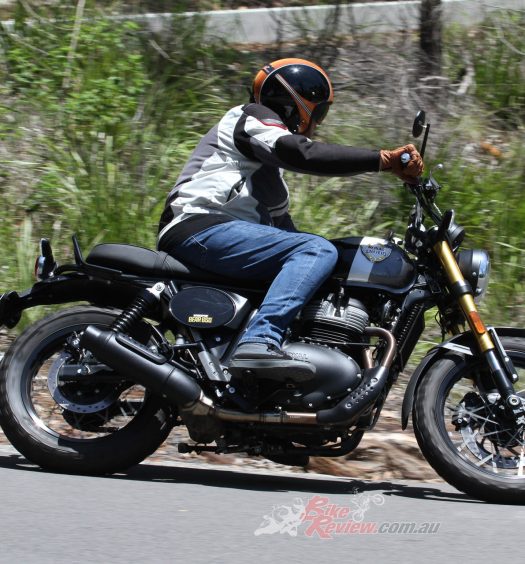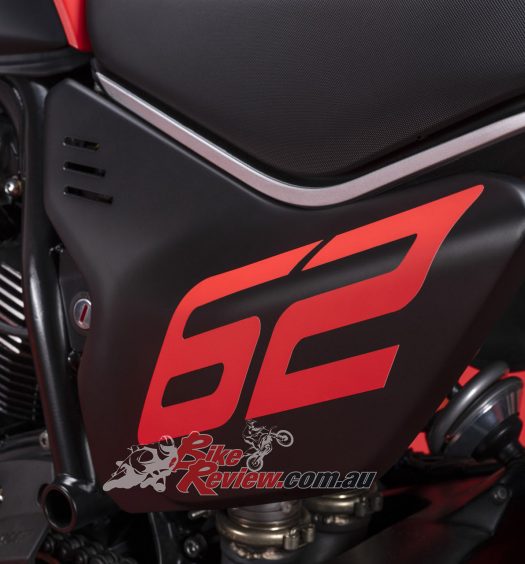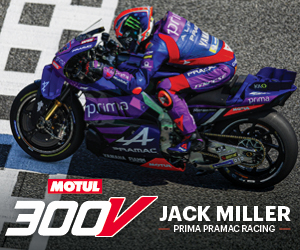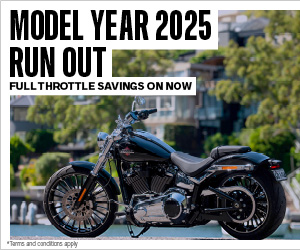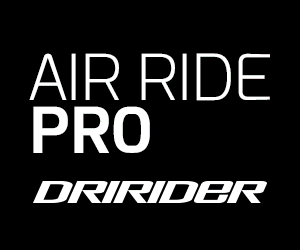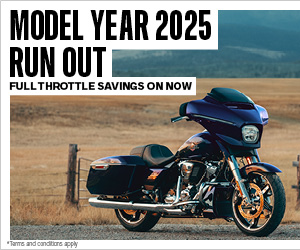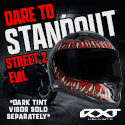Kris Quick Test's Ducati's Roland Sands Design Scrambler Mach 2.0 after the Desert Sled, for a more road orientated look at the model line. Words & Images, Kris Hodgson, David H.
Having just tested Ducati’s Scrambler Desert Sled I was eager to also check out the Mach 2.0 and the Café Racer. The Mach 2.0 is a Roland Sands Designs themed version, with special paintwork, and compared to the ‘Sled follows more closely in the standard Scrambler blueprint.
What struck me immediately was how comfortable and easy going the manner of the Mach 2.0 was, with the more road based ergonomics in comparison to the Desert Sled. I greatly enjoyed my time on the Sled, but the Mach 2.0 with its lower ‘bars and more relaxed ergonomics felt lighter, quicker steering and a bit more hoony around town.
Checking the spec’s later I was also surprised to see gearing between the two models was the same, as I really felt the Sled had lower gearing. The slightly less off-road orientated standard tyres on the 2.0 offer a more neutral handling characteristic, there’s no aggressive drop onto the side of the tyre, but with the more typical nakedbike ergonomics you feel more at one with the bike, rather than perched on it like with the Sled.
That same Desmodromic 803cc L-twin powers the Mach 2.0, and testing around town proves this bike is an ideal everyday ride, with plenty of capability for exciting weekend trips to more challenging roads. Power down low is punchy, with a strong low to mid-range that rewards being active through the gearbox and staying in that torque range, with the top end flattening out and offering more linear acceleration.
A light clutch lever makes plenty of gear use easy and doesn’t cause fatigue in traffic, while the gearbox is on the clunky side, particularly between first and second gears. If you were planning to commute on the Mach 2.0 every day I don’t think you’d be disappointed in fact, and lane splitting is easy if not quite as narrow as a sportsbike, while you’ve got an ideal weekend cruiser that’ll out-perform cruisers – especially through the twisties – and be lots of fun.
The single 320mm front rotor with Brembo caliper offers strong stopping power considering the claimed 186kg wet weight, and there’s good bite from the rear. On this kind of bike I always find myself asking the question, “Is there enough brake power?” and the answer is definitely yes, with the backup of ABS.
Suspension is an area I never really even thought about, it did the job, and did it well across a number of different surfaces, from pristine tarmac, to our usual rubbish roads, as well as a bit of the rough stuff. There’s some adjustability on the rear and smaller 41mm KYB forks and it’s a well balanced offering for my 70kg or so in gear.
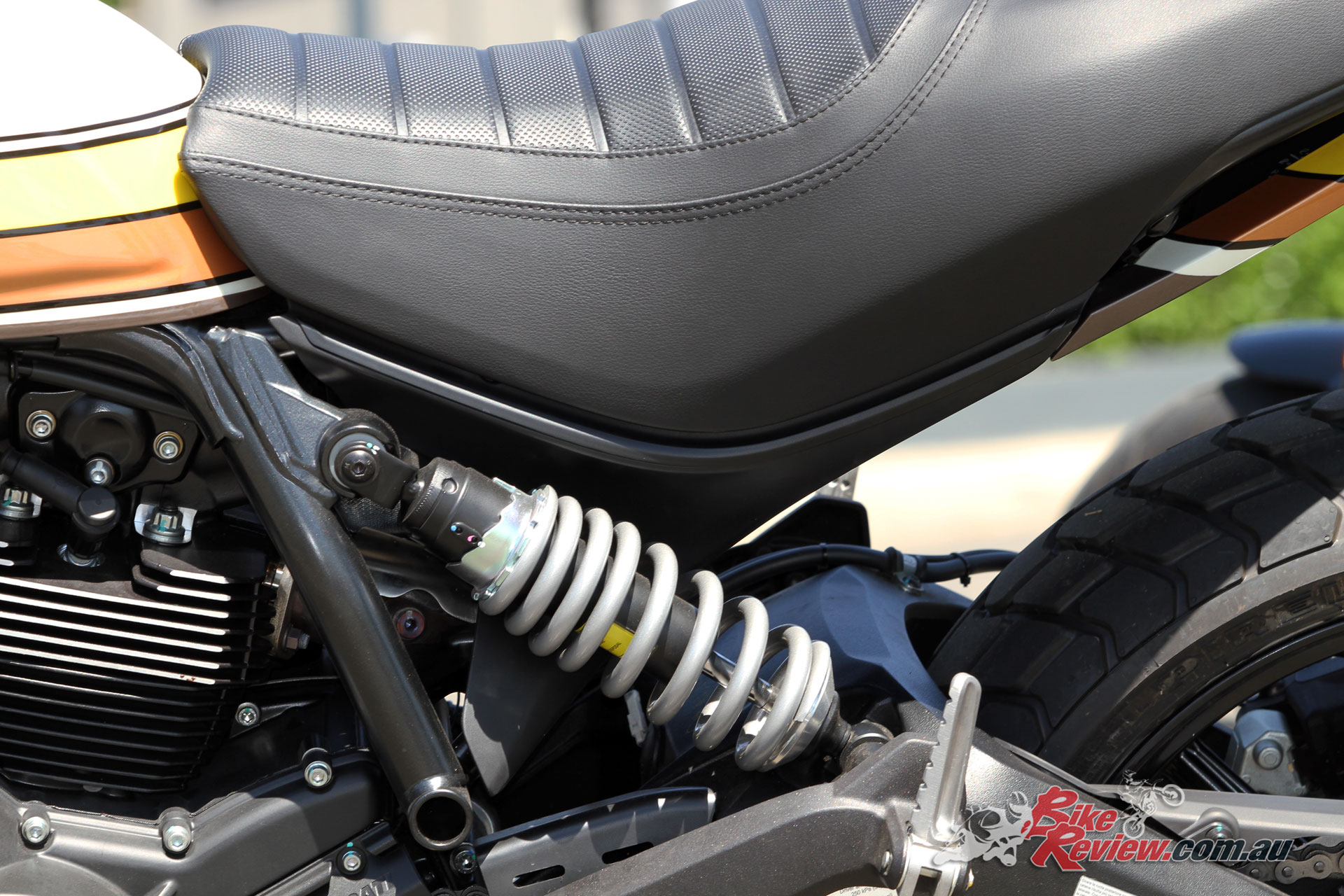
Adjustability on the rear shock is limited but gives some additional flexibility, while the overall system did a great job for my 70kg weight
Basically, if you’re feeling the sport limitations of this bike you should have bought the Monster 797 or the 1200! Now obviously the Scrambler offerings are a bit of a departure from the more recent Ducati fare, and while an extensive electronics package isn’t found, there’s ABS and the kind of machine that leaves you scoffing at other electronic aides. Less sporty than a Monster, and significantly less-so than a Panigale, the Scrambler is the brand’s no-frills, more relaxed option.
I seem to be mentioning it a lot lately, and it may be a sign of the times, but there’s been a definite swing back towards the basics of motorcycling. At the end of the day, most people don’t need 200hp and it’s far easier to justify something like the Scrambler to yourself and family, from an enjoyment, value and safety aspect.
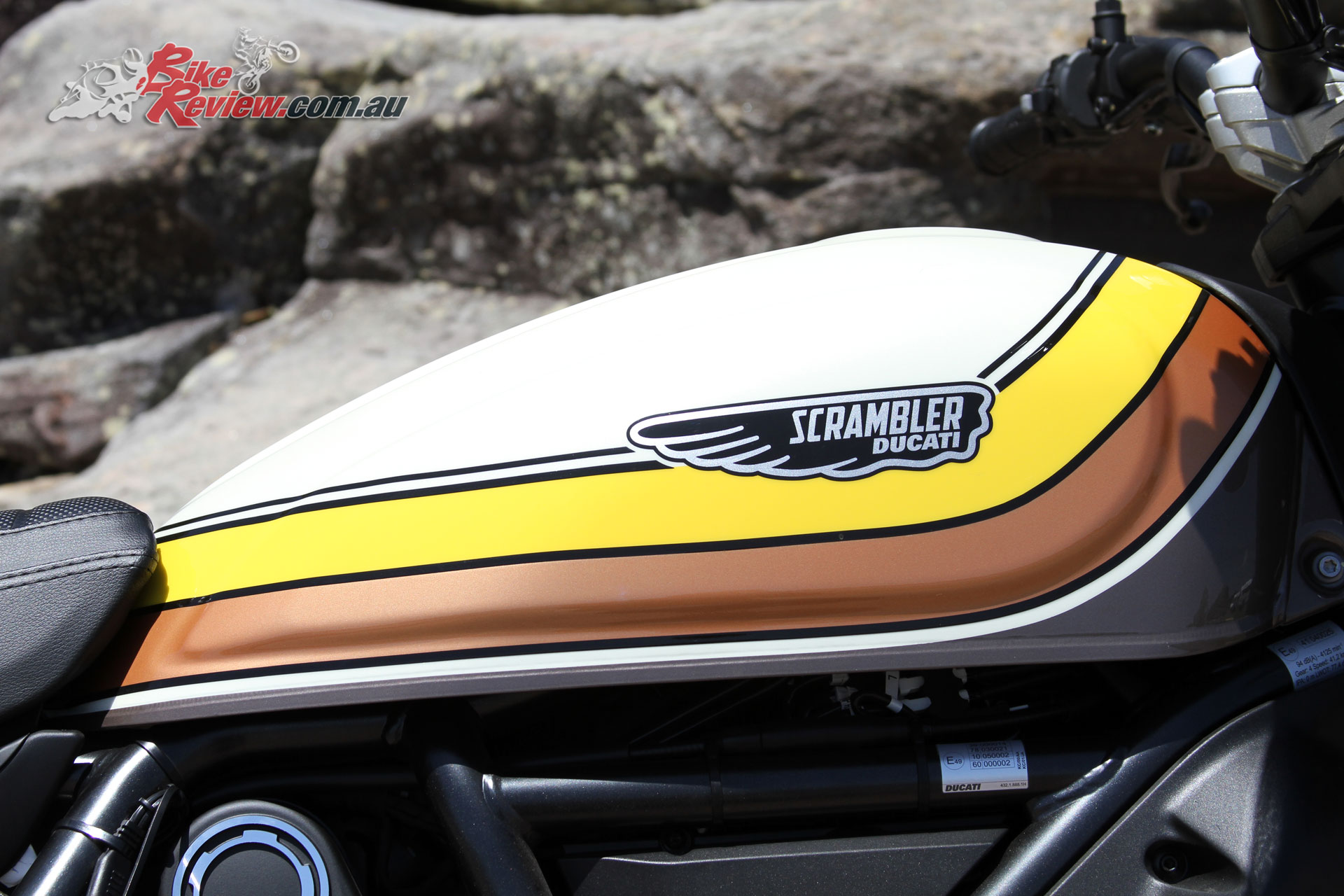
The paintwork is a real standout feature on the Mach 2.0, despite just featuring on the front guard, tank and tail
Plus build quality is typical of Ducati, with the Roland Sands Designs Mach 2.0 a limited edition offering, giving additional collectability, for those who like something different. And there’s the huge range of Scrambler accessories available for further customising.
Having tested the Desert Sled, Cafe Racer and the Mach 2.0 back to back, it was also easy to appreciate the standard Scramblers general road manners and usability. The Desert Sled is no doubt the better explorer, but the Mach 2.0 is a great street machine. We also tested the LAMS aprroved Sixty2 the Flat Track Pro.
There’s much more to this bike of course, but this is a quick test and I’d highly recommend giving the Mach 2.0, or any of the Scramblers really, a try if you’re in the market, looking to upgrade, or perhaps even downgrade to something a bit more relaxed. Don’t be frightened by that 73hp power figure, these are a great machine, with a characterful powerplant and truly live up to the Ducati name.
Second Opinion – David H.
The Mach 2 is another variant in Ducati’s range of Scramber family, sharing as it does most of the mechanical parts that make up the range. However it differs from the other models in being styled by Roland Sands, the American style guru. I’m not convinced it makes it a better bike than others in the range, but with its colour palet and styling it sure stands out in a crowd.
The abbreviated front guard, four colour petrol tank with swooping stripes, higher set flat handle bars, long seat and small ducktail give it a very individual style. A colour coded helmet is also available from Ducati for the full Roland Sands style hit.
The dual seat and pillion footpegs allow carrying a pillion, probably in some comfort, but I would suggest it would be for a short distance. It is very light and manoeuvrable, but the tyres remove some of the ease of manhandling the bike into parking spots and impart a slightly heavier feel compared to the Café Racer, which we tested at the same time.
The higher set flat bar are allied with excellent rear vision mirrors give you a great view of what is happening behind you. You can get complete coverage if you take a little time for adjustment. This is really welcome! I’m sick of seeing my elbows in ‘rear vision’ mirrors.
As with all of the Scrambler family, finish on all the visible components is very good, with the tank and ducktail paint a real stand out due to its depth of finish.
I found the suspension performed as expected, with surface joints handled well with you being aware you had crossed one without any jarring, while larger divots were handled equally as well. The bike steers well at all speeds from feet up dribbling through traffic to out on the open road and on the freeway. Basically the bike goes where it is pointed with little fuss.
The cross tyres work admirably, but I feel road tyres would make a discernible difference if this was your daily ride, or you push on a bit. Power was never a problem in city riding, and out on the open road should provide plenty of thrills. It really is a delight to cruise along enjoying the exhaust note as well as bend swinging.
The controls are light and provide good feedback. The clutch and brake levers are nicely sized to suit a range of hand sizes and reach. The blinkers, horn and starter are all well positioned and fall readily to hand. The cancelling of the blinkers is a bit hit and miss, you need to hit the button just right, but a longer period of ownership should have this sorted pretty quickly. This is common to all Scramblers, as is that moving off from standstill only requires around 1000 to 1500rpm to get the bike moving, and to keep ahead of traffic requires only a couple of thousand more. Fuelling is also excellent.
The single front Brembo disc brake is powerful, able to be well modulated, as is the rear, not too powerful or ineffective, just right. The combined tacho and speedo is simple and gives all the information required including a gear indicator. The warning lights are visible in our strong sunlight too.
The seat is at the normal height range for a modern bike, meaning that people under 167cm will probably have trouble getting both feet on the ground. One foot can be planted firmly though.
My only complaint is that the riders footpegs are right where my legs naturally go when coming to a stop. This is a function of seat size and shape and the footpeg location, but I found it awkward. However, it may just be my problem.
There is no questions on comfort however, the seat is nicely padded, and provides a nice comfy perch that allows you to move around if required. The handlebars are set at just the right height and width to provide a good arm bend and shoulder position, while allowing very effective leverage.
The riding position is of the sit up style, but there is no impediment to crouching down/forward if you decide to give it the berries. For cruising along, and in the cut and thrust of city riding I found it perfect. The vibration free nature of the engine ensures no vibes affect your extremities, while the rear vision mirrors stay very clear.
The engine is a nice mid-size unit. To me the style of the bike is cruising, being seen out and about, with a more spirited ride possible at the twist of the wrist. The engine is perfect for the intended purpose, with the torque available you are rewarded with an effortless ride. There is power right through the rev range, but it tapers off in the higher revs, a sign that Ducati rightly thinks that this bike is more suited to a torquey, ‘do most things well’-type of bike.
You could quite happily commute on it, it cruises effortlessly along beach strips and city streets and you can most assuredly have fun in the twisties. The gear changes are short and crisp, both up and down the gearbox, with just a snick on the gear lever required. I found it best to engage neutral just before coming to a stop.
This bike is a style module based on a very competent motorcycle. The addition of the Roland Sands styling and paint scheme has made for a very individual look.
So just like the rest of the Scrambler family, this bike will appeal to returning riders, older riders wanting to down size but not lose the fun factor, and younger riders. However, it should also appeal to the trendy set given its association with Roland Sands. It is light, has ample performance and handling to be an everyday ride in my opinion, while still having its street cred for cruising and posing.
Most rides should end up with a grin on your face and feeling pretty pleased with yourself.
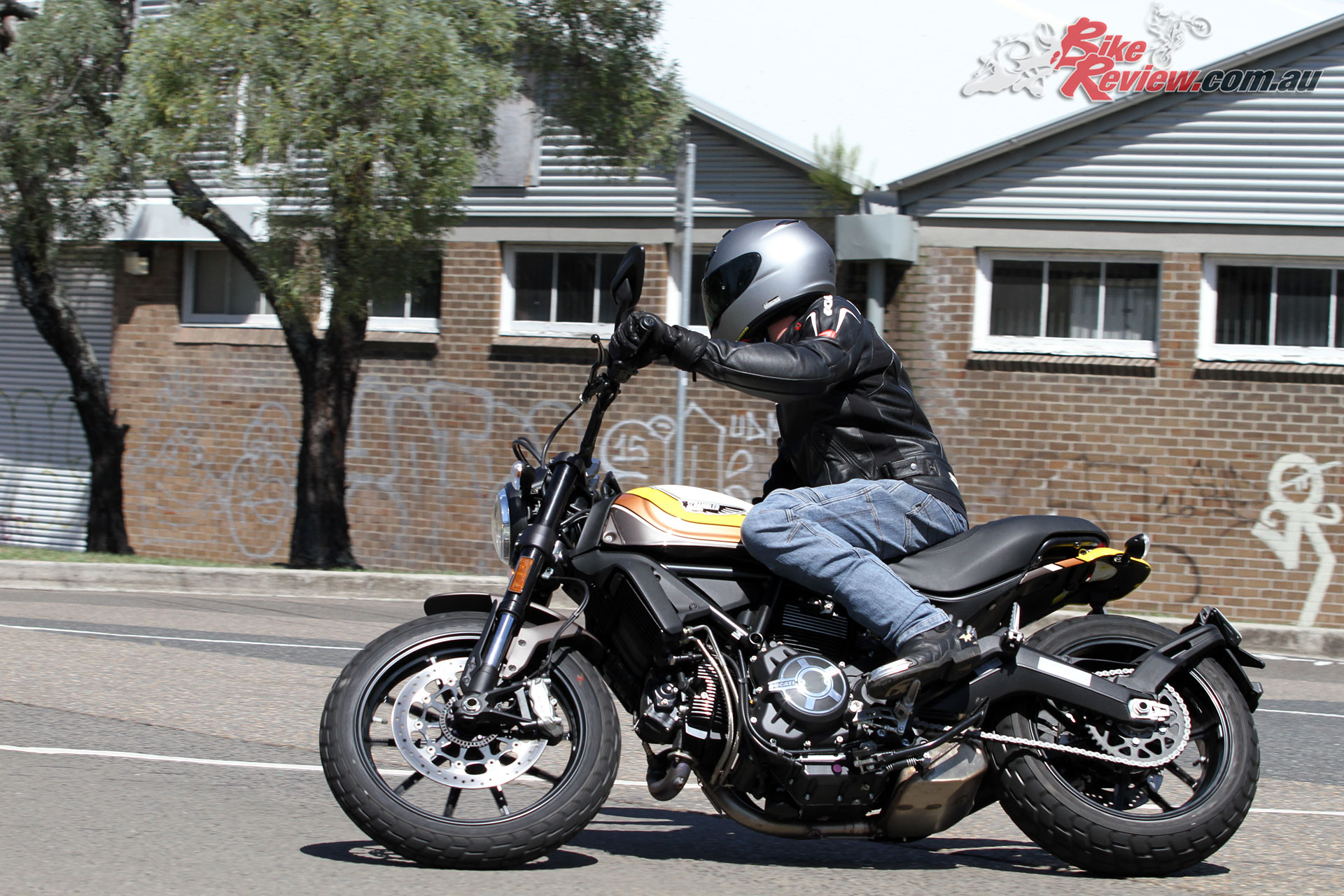
The Scrambler line, and the Mach 2.0 are ideally suited for returning riders and those looking for a fun machine to downsize to, if ergonomics are becoming a concern, and are also a great step up from many learner machines
2018 Ducati Scrambler RSD Mach 2.0 Specifications
Ducati.com.au
Price: $15,890 + ORC
Warranty: 24-month, unlimited kilometre
Service Interval/Valve Clearance check: 12,000km
Engine: Air-cooled, L-Twin, Desmodromic, two-valves per cylinder, 803cc, 88 x 66mm bore x stroke, 11:1 compression ratio, Stainless steel muffler, aluminium tail pipes, EFI, 50mm throttle-body
Claimed Power: 54kW(73hp)@8250 rpm
Claimed Torque: 67Nm (49lb-ft)@5750 rpm
Gearbox: Six-speed
Final drive: Chain; Front sprocket 15; Rear sprocket 46
Clutch: APTC wet multiplate with mechanical control
Frame: Tubular steel Trellis frame, aluminium double-sided swingarm
Suspension: 41mm USD KYB forks, 150mm travel, Kayaba rear shock, pre-load and rebound adjustable
Wheels: Spoked aluminium wheels, 3.00 x 18in, 5.50 x 17in
Tyre: Pirelli MT 60 RS, 110/80 R18, 180/55 R17
Brakes: ABS, 330mm front rotors, radial four-piston Brembo calipers, 245mm rear rotor, single-piston floating Brembo caliper
DIMENSIONS:
Wheelbase: 1445mm
Rake: 24°
Trail: 112mm
Steering lock: 35°
Fuel tank capacity: 14L
Claimed dry weight: 170kg
Claimed wet weight: 186kg
Seat height: 790mm
Max height: 1150mm
Max width: 845mm
Max length: 2100mm
EQUIPMENT
Steel tank, headlight with glass lens, LED light-guide and interchangeable aluminium cover, LED rear light with diffusion-light, LCD instruments with interchangeable aluminium cover, machine-finished aluminium belt covers, under-seat storage compartment with USB socket, Low aluminium handlebars, flat-track inspired seat, black silencer cover, black engine with brushed fins, dedicated designed logo,
2018 Ducati Scrambler Mach 2.0 Gallery
The Verdict | Review: 2018 Ducati Scrambler RSD Mach 2.0
Stylish


